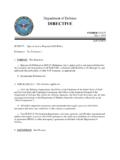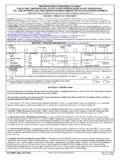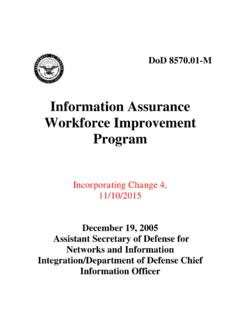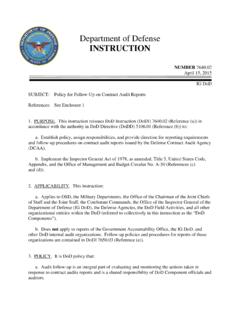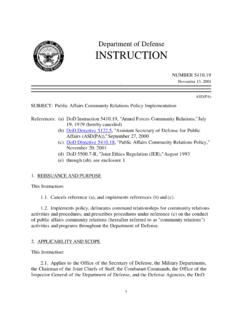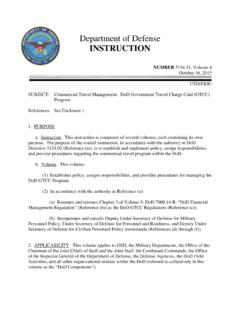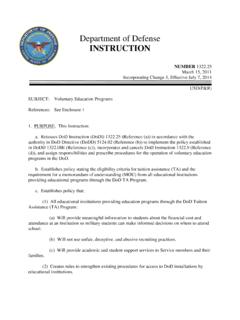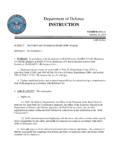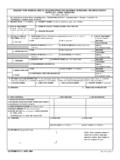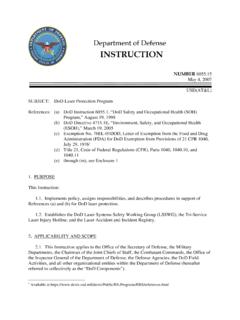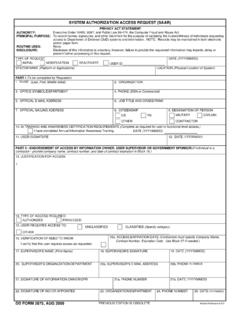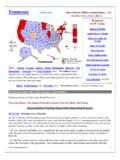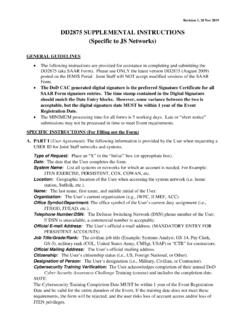Transcription of DoD Instruction 8520.03, May 13, 2011; …
1 Department of Defense Instruction NUMBER May 13, 2011 Incorporating Change 1, July 27, 2017 DoD CIO SUBJECT: Identity Authentication for Information Systems References: See Enclosure 1 1. PURPOSE. In accordance with the authority in DoD Directive (DoDD) (Reference (a)), this Instruction : a. Implements policy in DoD Instruction (DoDI) (Reference (b)), assigns responsibilities, and prescribes procedures for implementing identity authentication of all entities to DoD information systems. b. Establishes policy directing how all identity authentication processes used in DoD information systems will conform to Reference (b).
2 C. Implements use of the DoD Common Access Card, which is the DoD personal identity verification credential, into identity authentication processes in DoD information systems where appropriate in accordance with Deputy Secretary of Defense Memorandum (Reference (c)). d. Aligns identity authentication with DoD identity management capabilities identified in the DoD Identity Management Strategic Plan (Reference (d)). e. Establishes and defines sensitivity levels for the purpose of determining appropriate authentication methods and mechanisms. Establishes and defines sensitivity levels for sensitive information as defined in Reference (b) and sensitivity levels for classified information as defined in Volume 1 of DoD Manual (Reference (e)).
3 2. APPLICABILITY a. This Instruction applies to: (1) OSD, the Military Departments, the Office of the Chairman of the Joint Chiefs of Staff and the Joint Staff, the Combatant Commands, the Office of the Inspector General of the DoDI , May 13, 2011 Change 1, 07/27/2017 2 DoD, the Defense Agencies, the DoD Field Activities, and all other organizational entities within the DoD (hereinafter referred to collectively as the DoD Components ). (2) The united states Coast Guard. The united states Coast Guard will adhere to DoD cybersecurity requirements, standards, and policies in this Instruction in accordance with the direction in Paragraphs 4a, b, c, and d of the Memorandum of Agreement Between the Department of Defense and the Department of Homeland Security (Reference (ae)).
4 (3) All DoD unclassified and classified information systems including networks ( , non-classified Internet Protocol Router Network, Secret Internet Protocol Router Network (SIPRNET)), Defense Research and Engineering Network, Secret Defense Research and Engineering Network web servers, and e-mail systems. (4) All DoD and non-DoD personnel entering or exiting DoD facilities or installations that authenticate to a physical access control system (PACS). (5) All DoD and non-DoD entities (human and non-person) logically accessing DoD unclassified and classified information systems including, but not limited to, DoD web-based systems, DoD websites, DoD web servers, and DoD networks.
5 Hereinafter in this Instruction , use of entities refers to human and non-person users. b. This Instruction does NOT apply to: (1) Unclassified internet-based systems specifically intended to engage DoD mission partners, known and unknown, in nontraditional missions such as humanitarian assistance, disaster response, stability operations, or building partner capacity. (2) Sensitive Compartmented Information and information systems operated within the DoD that fall under the authority provided in Intelligence Community Directive 503 (Reference (f )). This Instruction also does not apply to Top Secret collateral systems, special access programs, and stand-alone networks with no connection to the Global Information Grid.
6 3. DEFINITIONS. See Glossary. 4. POLICY. It is DoD policy in accordance with Reference (b) that: a. All DoD information systems or DoD networks that either host information that has not been approved for public release in accordance with DoDD and DoDI (R eferences (g) and (h)) or electronically facilitate physical access to DoD facilities shall authenticate all entities as specified in this Instruction prior to granting access. (1) The information system or DoD network shall ensure that any credential used for identity authentication is appropriate for the authenticating entity s environment or physical DoDI , May 13, 2011 Change 1, 07/27/2017 3 location and the sensitivity level of the information or force protection level of the facility or other resources for which the information system facilitates access or privilege.
7 This Instruction provides criteria and methodology for determining appropriate identity credentials for authentication in Enclosure 3. (2) The information system or DoD network shall ensure that any credential used for identity authentication has been issued by an approved DoD identity credential provider or a DoD-approved Federal or industry partner identity credential provider. (3) The information system or DoD network shall verify that any identity credential used for identity authentication has not been revoked by the identity credential provider or otherwise declared invalid. In situations where the automated mechanisms used for revocation checking are not available ( , on-line certificate status protocol responses from the Robust Certificate Validation Service or certificate revocation lists (CRLs) from the Global Directory Service), systems or networks will perform credential revocation checking in accordance with the applicable credential policy ( , cached CRLs) or a documented standard operating procedure.
8 B. The information system or DoD network shall validate during logon that the authenticator (the value or data object used to prove the claimant possesses and controls the identity credential) is bound to the identity credential used in the identity authentication process. c. DoD information systems or DoD networks granting access to entities using non-DoD controlled computers ( , not Government-furnished) or non-DoD networks shall ensure the identity credential used and sensitivity level of the information or other resources for which the information system facilitates access are appropriate for the non-DoD system or non-DoD network environment from which the identity authentication session initiates.
9 This Instruction provides criteria for determining appropriate authentication methods and mechanisms. d. All DoD information systems or DoD networks that host any information that has not been approved for public release in accordance with References (g) and (h) shall implement rules-based processes for: (1) Mapping an authenticated identity to a network or information system account or role. (2) Granting or denying access to information based on the authorizations associated with an account or role. (3) Disabling, suspending, or removing accounts when access is no longer authorized. (4) Terminating access to the related application account(s) when a role changes or is terminated.
10 This may be accomplished through rules or through documented standard operating procedures. DoDI , May 13, 2011 Change 1, 07/27/2017 4 e. As the capability to execute dynamic rules-based or attribute-based access control becomes available, DoD Component-appointed authorizing officials (AOs) may authorize its use as appropriate. f. Operators of DoD networks and information systems shall develop and document the procedures for managing access control, including procedures for making authorization decisions when the primary access control mechanisms are unavailable. g. DoD information systems or DoD networks shall authenticate devices (non-person users) that connect to them during the course of their operations or processing, as specified in this Instruction , prior to granting connection or access.
